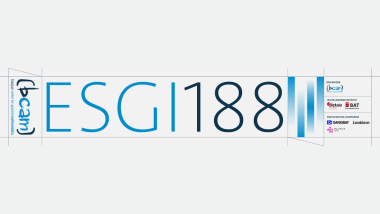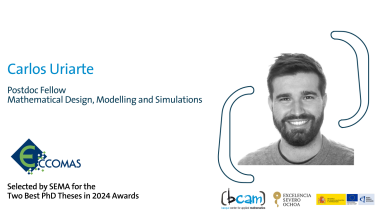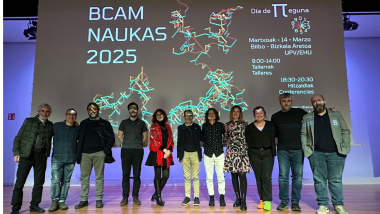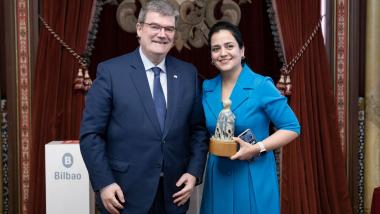- La defensa ha tenido lugar en la Facultad de Ciencia y Tecnología de la Universidad del País Vasco, situada en el Campus de Leioa
Mario Fernández-Pendás se incorporó al Basque Center for Applied Mathematics como becario en el área de investigación de
Modelización Matemática con Aplicaciones Disciplinarias en 2013 y posteriormente, se convirtió en estudiante de doctorado bajo la supervisión de Elena Akhmatskaya en 2014. Es Licenciado en Matemáticas por la Universidad de Oviedo en 2011 y obtuvo un Máster en Matemáticas y Computación por la Universidad de Cantabria en 2012.
Su tesis doctoral ha sido dirigida por la investigadora de Ikerbasque Elena Akhmatskaya, responsable del Grupo de
Modelización y Simulación en Ciencias de la Vida y de los Materiales de BCAM.
En nombre de todo el equipo de BCAM nuestra más sincera enhorabuena a Mario.
[idea]
Title: Adapting Hybrid Monte Carlo methods for solving complex problems in life and materials sciences
Efficient sampling is the key to success of molecular simulation of complex physical systems. Still, a unique recipe for achieving this goal is unavailable. Hybrid Monte Carlo (HMC) is a promising sampling tool offering a smart, free of discretization errors, propagation in phase space, rigorous temperature control, and flexibility. However, its inability to provide dynamical information and its weakness in simulations of reasonably large systems do not allow HMC to become a sampler of choice in molecular simulation of complex systems. In this thesis, we show that performance of HMC can be dramatically improved by introducing in the method the splitting numerical integrators and importance sampling.
We propose a novel splitting integration scheme called Adaptive Integration Approach or AIA, which leads to very promising improvements in accuracy and sampling in HMC simulations. Given a simulation problem and a time step, AIA automatically chooses the optimal scheme out of the family of two-stage splitting integrators. A system-specific integrator identified by our approach is optimal in the sense that it provides the best conservation of energy for harmonic forces.
The role of importance sampling on the performance of HMC is studied through the modified Hamiltonian Monte Carlo (MHMC) methods, sampling with respect to a modified or shadow Hamiltonian. The particular attention is paid to Generalized Shadow Hybrid Monte Carlo (GSHMC), introduced by Akhmatskaya and Reich in 2008. To improve the performance of MHMC in general and GSHMC in particular, we develop and test the new multi-stage splitting integrators, specially formulated for sampling with respect to modified Hamiltonians. The novel adaptive two-stage integration approach or MAIA, specifically derived for MHMC is presented. We also discuss in detail the adaptation of GSHMC to the NPT ensemble and provide the thorough analysis of its performance. Moreover, for the first time, we formulate GSHMC in the grand canonical ensemble. A general framework, useful for an extension of other Hybrid Monte Carlo methods to the grand canonical ensemble, is also provided.
The software development is another fundamental part of the present work. The algorithms presented in this thesis are implemented in MultiHMC-GROMACS, an in-house version of the popular software package GROMACS. We explain the details of such implementation and give useful recommendations and hints for implementation of the new algorithms in other software packages.
In summary, in this thesis, we propose the new numerical algorithms that are capable of improving the accuracy and sampling efficiency of molecular simulations with Hybrid Monte Carlo methods. We show that equipping the Hybrid Monte Carlo algorithm with extra features makes it even a “smarter” sampler and, no doubts, a strong competitor to the well-established molecular simulation techniques such as molecular dynamics (MD) and Monte Carlo. The up to 60 times increase in sampling efficiency of GSHMC over MD, due to the new algorithms in simulations of selected systems, supports such a belief. [/idea]




